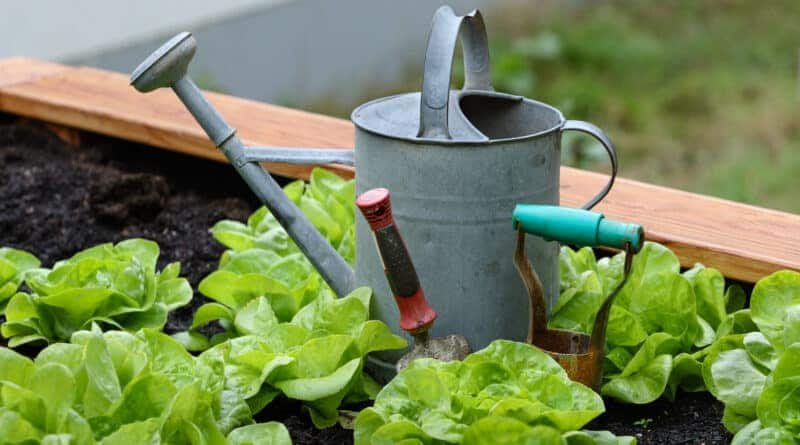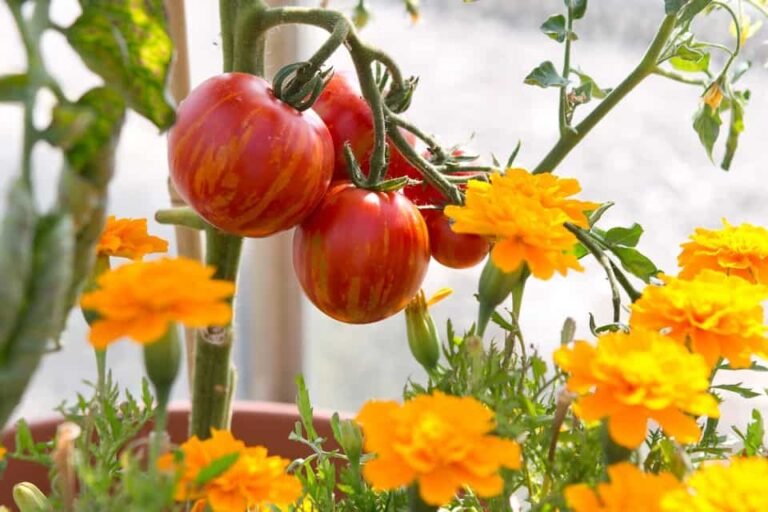8 Simple Gardening Tips For Growing Vegetables in 2024

Are you a gardener looking for simple gardening tips for growing vegetables that will help you to maximize the use of your garden space?
If your answer is yes, then you are reading the right piece of article.
As long as you want to own a vegetable farm, and you want to avoid getting the worst harvest this year, then you have to follow these guidelines.
In this guide, you will learn about the different types of veggies that thrive well and are easy to grow even by a beginner.
You will also learn some gardening tips and tricks that will help you to grow your own food, and enjoy the flavor and texture of having fresh veggies that are not store-bought.
Also, you will learn how to keep your vegetables luscious all year long.
In this guide is a list of gardening tips and tricks for vegetable gardeners.
These tips will give you insight into how to plant, tend, and have a blooming vegetable garden.

Everything You Need to Know Before Starting a Vegetable Garden.
Vegetables fall within two categories
- Those that thrive and grow in cool weather.
- And secondly, those that grow in warm weather.
Spinach grows well in cool weather but tastes bitter when grown in the rainy season.
However, tomatoes on the other hand won’t turn red in time if you plant them too close to fall.
Understanding these and more keeps you on alert on how to go about your vegetable gardening.
If you’re looking to start a vegetable garden for beginners, here are the essential and unavoidable steps to start your guest vegetable farm;
- Start with a small space.
- It’s easier to grow what you love to eat.
- Choose the spot for your garden. Ensure to consider the sun’s position and level ground.
- Plan your vegetable garden layout.
- Start plants in rich soil.
- Know when to plant and what to plant.
- Be Ready for pests and diseases.
- Know when to harvest and when to move into a shade.
Majorly these are the unavoidable steps you must take as a beginner in Vegetable gardening.
What are The Easiest Vegetables To Grow?
Just before we give you the gardening tips for vegetables, it’s ideal that you know the kind of vegetable that is not just easy to plant but also produces a high yield.
Here is a list of the easiest vegetables to grow by yourself;
- Peas.
- Kale.
- Lettuce.
- Carrots.
- Radishes.
- Green Beans.
- Cucumbers.
- Swiss Chard.
However, depending on your region, the kind of vegetables may differ a bit.
Gardening Tips To Grow Your Vegetables.
Now if you’re looking for the best steps to grow your vegetables then that’s not a wrong move.
Ideally, your vegetable garden will produce the desired result if you tend them well.
Also knowing the right kind of veggies to plant and when to garden saves you from a lot of garden disasters.
Here are some tips to help you grow your Vegetables;
#1. Plant High-Yield Vegetables.
Most gardeners expect a high yield from vegetable plants that naturally do not yield much.
And that’s a gardening fail tip for vegetable gardeners.
In our article “How To Start A Garden From Scratch“, we emphasized the need for a good space and site.
Make the most out of your space, time, and resources into growing vegetables by planting veggies that yield much.
It’s sad to put all your effort into growing vegetables and at harvest, it yields a small yield.
So what kind of vegetables produce a high yield?
At the top of our list include veggies like tomatoes, onions, and lettuce.
Basically, these vegetables do not require much space and time to tend them but what they yield in return is massive.
#2. Garden Using Quality Soil.
One of the gardening tips and tricks for beginners as stated in our article is to plant on good soil.
Because plants get their nutrients from the soil, it only makes sense to ensure the soil is nutrient-rich and well-drained.
Invariably, the better the soil, the better and tastier the vegetables will be at harvest time.
For soil that’s not ideal for a vegetable garden, you can improve it by adding organic matter or by mulching.
However, ensure that you mulch or add organic matter to the soil on a still day and water it well to weigh it down.

#3. Plant the Right Crops for Your Region
Understanding your region is ideal for knowing what plants to grow and when to grow them.
Although there is no one size fits all guide on when to plant your crop due to differences in the region.
However, plants such as tomatoes, peppers, and corn should not be planted before the soil warms up.
Also, to make this gardening tip work for the vegetables you choose to grow, ensure to check the days of maturity of each seed packet or plant label to see if you have enough time to grow them in relation to the season.
#4. Ensure You Properly Water Your Vegetable Garden.
One tip that you should keep handy at all times if you are gardening veggies is that vegetables benefit from a consistent watering schedule.
Water them less and you will not get anything from the garden. Water them too much, you end up drowning the roots and spoiling the fruit.
So what do you do?
Find a balance.
Do not over or underwater your vegetables.
Ensure you consistently water them enough by using a watering nozzle at ground level.
This is to ensure you deliver moisture even to the plant’s roots.
Here’s an easy way to do it.
- Hook a hose up to a programmable timer.
- Set it.
- Focus on the more labor-intensive vegetable gardening tips.
#5. Most Vegetables Do Not Grow Well in Areas With Less Sunshine.
Keep in mind that only a few vegetables grow with less than half a day of sun.
If your vegetable garden is in a shady area, be rest assured that they won’t get enough sun. And that means less yield.
You may have to move it to another area of the yard.
Ensure you take the time to start a vegetable garden the right way, your veggies will reward you.
#6. Improve the Taste of Your Vegetables
Do you know you can improve the taste of your vegetables?
It’s no longer news that store-bought vegetables often lack flavor. This is so because they’re grown in the wrong season.
Vegetables such as spinach and kale taste bitter if they are planted in the harmattan.
Tomatoes on the other hand won’t turn red in time if you plant them too close to rain seasoning.
Therefore, plant your veggies at the proper time to reap the best harvest.
This is one of those gardening tips for vegetables no one will tell you.
#7. Use a Vertical Trellis or Fence to Save Space.
If space is a major concern for you, you can adopt a vertical trellis or fence to accommodate some crawling veggies.
From the professional vegetable garden point of view, vegetable gardeners are encouraged to look up!
You can actually grow more in less space if you adopt this tip.
In fact, it can even double your garden yield by increasing sunlight, easing harvest, and allowing for easier pest management.
You can use garden trellises to support plants, such as tomatoes, cucumbers, beans, and small melons.
#8. Defend Your Vegetable Garden Against Pests.
Pests are garden effort destroyers. They weaken plants and take nutrients away from vegetable production.
Once there is a pest infestation, it reduces yield as well as the growth of the garden plants.
The best way is to get rid of them.
However, before you get a pesticide to eliminate these unwanted guests, consider some alternative solutions.
What other alternative solution could there be to pest control?
Of course, there are many ways to combat pest problems by using natural remedies other than pesticides.
Such measures include; floating row covers, handpicking, and slug traps.
We often recommend these measures because pesticides contain chemicals that may not be ideal for your veggies and human consumption.
These gardening tips for vegetables are a trick that has helped generations of Vegetable gardeners.
Usually, these have helped gardeners equate their efforts to the yield of their vegetable farm.
And in fact, it comes with little work as opposed to the long-standing tradition.
Extra Tip: Raise Chickens
Putting chickens in the garden might seem counterintuitive initially, but the practice has benefits.
For one, domesticated fowl can serve as a natural pest management system.
Chickens eat grubs, beetles, ticks, earthworms, crickets, and other insects that may harm your garden.
These birds will even devour small snakes. Just make sure to confine your feathery pets to a designated part of the garden by installing poultry fencing or netting. This keeps both your animals and your plants safe.

Ensuring Garden Health: A Guide to Bed Bug Inspection for Lush Vegetables
Maintaining a thriving vegetable garden goes beyond watering and fertilizing – it also involves vigilant pest control, including bed bug inspection. These tiny pests can wreak havoc on your plants, compromising the health of your garden.
Begin by regularly examining the undersides of leaves, where bed bugs often hide, and watch for signs like yellowing foliage or minor bite marks.
If an infestation is detected, consider employing natural predators like ladybugs or organic sprays to control the population.
By incorporating thorough bed bug inspection into your gardening routine, you’ll nurture robust and pest-free vegetables, ensuring a bountiful harvest.
Frequently Asked Questions About Gardening Tips For Vegetables.
How Can I Improve My Vegetable Garden?
The very dream of most vegetable farmers is to see major growth in their gardens.
If you want to boost your vegetable yield, here’s what to do;
- Nourish Your Soil.
- Feed Your Plants.
- Grow in Dedicated Beds.
- Choose Plants that Thrive.
- Grow More in the Shade.
- Collect More Rainwater.
- Extend the Growing Season.
- Space Plants Correctly.
What is The Most Efficient Way To Grow Vegetables?
Although planting vegetables in the soil is ideal, the fastest and most efficient way to get the best out of any soil is to make raised beds.
Vegetables will grow well on raised beds.
Raised beds yield more than four times the same amount of space planted in rows.
This is so because the soil is loose, fertile, and spaced and there is more room to grow plants.
Which Fertilizer Is Best For Vegetables?
At some point in your vegetable gardening journey, you will need to add fertilizers to boost or improve the soil nutrients for your veggies.
Most veggie gardeners are confused as to which fertilizer is the best for vegetables.
The best fertilizers for vegetables are balanced fertilizers with an NPK of 10-10-10 or 5-5-5.
Usually, it’s best to use 1 pound of NPK 10-10-10 fertilizer per 100² feet of row and double the amount for NPK 5-5-5.
Excess of nitrogen results in lots of foliage and vines but no fruit.
What Kind of Vegetables Grow All Year?
Some vegetable plants grow all year round.
Such as said to be perennial vegetables. They potentially provide years of harvesting rather than having to start from scratch every year.
Such kinds of vegetables that grow all year include;.
- Okra.
- Peppers.
- Eggplant.
- Tomatoes.
- Horseradish.
- Onions/Leeks.
- Chayote Squash.
- Jerusalem Artichoke.
Of all the gardening tips for Vegetables, no one will tell you.
When Should I Add Fertilizer To My Vegetable Garden?
Adding fertilizer at the peak of a plant growing cycle.is the most effective time to use fertilizers on vegetables.
At this point, the plant is leafing out for deciduous species, flowering, or putting on new growth.
Fertilizing the plants at this time of the year works into them appropriately and yields standard results.
How Often Should You Fertilize Vegetables?
Ideally, it’s best you fertilize vegetables every three to four weeks throughout the growing season.
However, vegetables growing in porous, well-drained soil should be fertilized frequently.
Also do not stop the application when the fruit appears on the veggies.
Ensure you continue to apply fertilizer as needed to ensure continued production.
How Do I Fertilize My Vegetable Garden Naturally?
If you want to go the team’s natural way of fertilizing your fertilizers, here are 8 ways to do so;
- Manure.
- Eggshells.
- Tree Leaves.
- Banana Peels.
- Coffee Grounds.
- Grass Clippings.
- Use Kitchen Scraps.
- Remove weeds and compost them.
What Vegetables Consume Much Garden Space?
One of the gardening tips for vegetables is to use a trellis when possible, this is to help conserve space.
If you have space issues, do not plant veggies such as Melons, winter squash, and pumpkins.
Although they are fun to grow, they take much more space and produce very little.
Summary
If you’re growing vegetables, these gardening tips will help you produce luscious green veggies because you were able to tend them right.
Have you grown Vegetables? What strategy did you employ that left them blooming all year long?
Leave a comment in the comment section below!!!





